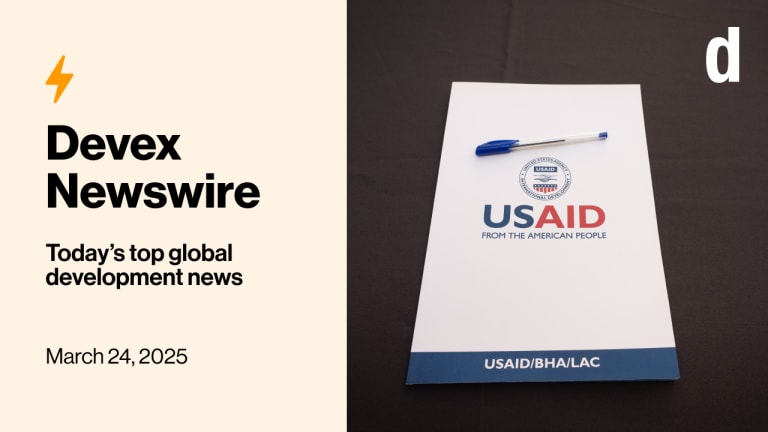
Questions are swirling about who will replace Henrietta Fore when she steps down from UNICEF’s top spot this year.
This is a preview of Newswire
Sign up to this newsletter for an inside look at the biggest stories in global development, in your inbox daily.
Experts following the selection process say the next UNICEF chief should be prepared to tackle unanticipated global challenges that have emerged during the pandemic.
U.N. data shows that the number of vaccines and immunizations reaching children dropped significantly after the start of the pandemic, with about 23 million children under the age of 1 not receiving basic vaccinations in 2020. During lockdowns, domestic violence and sexual assault against girls intensified and school closures affected 1.6 billion learners worldwide, while nearly 370 million children were deprived of school meals.
Cathy Russell, director of the White House Presidential Personnel Office, is among the names being floated to step into Henrietta Fore’s shoes. But there is also a growing push for the U.N. to select the agency’s first non-American leader in light of the decolonization movement in global health, writes Laura Kirkpatrick for Devex.
Read: What challenges does the incoming UNICEF chief face?
Field notes
Farmers who have suffered economic setbacks because of COVID-19 are increasingly turning to new technologies and other innovations to help them get back on their feet, Rebecca Root reports. According to Mercy Corps, 37% of smallholder farmers surveyed said their digital tool use had increased during the pandemic.
Yet additional changes to the practice of agriculture might also be needed, according to some civil society groups. COVID-19 may mean that countries begin to review their agriculture and food policies and decentralize food systems, according to Chris Macoloo, regional director for Africa at World Neighbors and chair of the Alliance for Food Sovereignty in Africa.
Read: Agriculture in the time of COVID-19
Dinner bell
“How can you put in place clear incentives towards healthier outcomes for people, planet, and the economy? How do we use financing as a lever to reduce negative costs and enhance the benefits associated with farming and food?”
— Martien van Nieuwkoop, global director for agriculture and food global practice, World BankThe U.N. Food Systems Pre-Summit kicked off this week in Rome, with world leaders, civil society, U.N. staff, and private sector representatives meeting ahead of the main event in September. Press isn’t allowed on site, so our reporter Teresa Welsh is following developments from afar. She reports that participants on day one emphasized the importance of financing if the summit’s lofty goals for food systems reform are to be achieved.
Read: Financing is key to food systems reform, say leaders at UN event
+Interested in learning more about food security? Devex is launching a weekly newsletter on food systems soon and we want to know what topics you think we should cover. Here’s a short survey for you — and don’t forget to sign up to receive the first edition.
EU oughta know by now
The council of the European Union has proposed a $590 million slash to the budget of its primary development tool, the Neighborhood, Development, and International Cooperation Instrument, for 2022. They proposed cuts in other categories too, but the development slashes were among the most dramatic. The European Parliament still has to sign off on the budget before the cuts are approved.
Devex Pro: EU Council proposes 2022 NDICI budget reduction
Still, the news isn’t all gloom for development funding. France now plans to allocate 0.7% of its GNI to official development assistance by 2025, which is a $7.6 billion ODA increase over France’s estimated 2021 spending. It’s thought to indicate an increased French focus on soft power — and perhaps a signal to the United Kingdom, which is retreating from its own commitment to spend 0.7% of GNI on aid.
Read: France approves massive increase of ODA budget
Cutting class
The Global Partnership for Education summit is happening this week amid ongoing concerns about U.K. budget cuts and restrictions on education and reproductive health programs. Advocates for girls education estimate that U.K. aid to those programs has been cut by as much as 40%, William Worley reports.
• The goal of the event — hosted by the U.K. and Kenya — is to raise $5 billion for the organization’s 2021-2025 funding.
• Devex has recently reported on Britain’s cuts to girl’s education programs. Plan International UK has also revealed that £730 million was cut from its GEC projects in Ghana, Zimbabwe, and Sierra Leone.
• Meanwhile, the International Planned Parenthood Federation has filed a legal challenge against the U.K. government over the cuts, estimating that the loss of funding will cause 7.5 million additional unintended pregnancies, 2.7 million unsafe abortions, and 22,000 maternal deaths over the next year. If the judicial review goes ahead — it must first be accepted by a judge — it could mean the cuts are deemed unlawful.
Read: UK cuts education aid even as its global summit approaches
ICYMI: Will is tracking all the U.K. aid cuts as they happen
In other news
Eight women allege that they were approached with a sex-for-aid scheme by locals helping with registration process for the displaced in Burkina Faso. [The New Humanitarian]
Amid political upheaval in Tunisia, broadcaster Al Jazeera says its offices were raided by police and ordered to shut down. [AP]
Landslides and severe flooding due to heavy rains have killed at least 180 in India, while over 200,000 people have been evacuated in the state of Maharashtra. [CNN]
Sign up to Newswire for an inside look at the biggest stories in global development.




